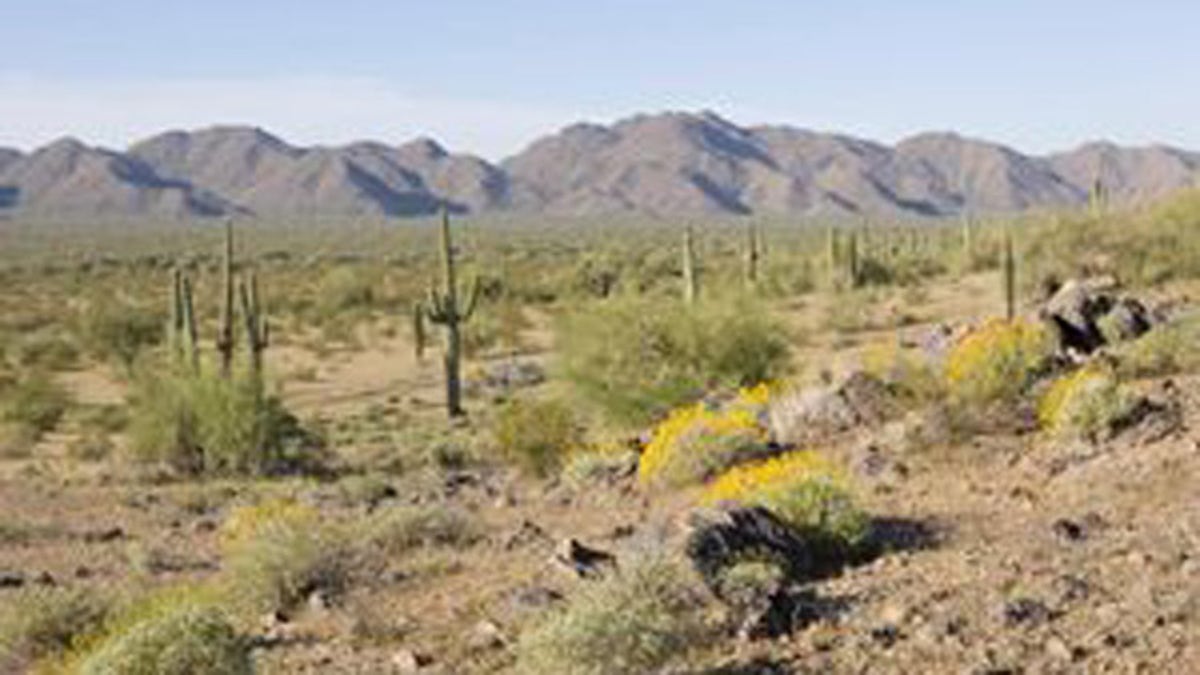
Shown here is land in the Sonoran Desert National Monument. (Bureau of Land Management)
Gun enthusiasts are rallying opposition to a string of new federal proposals that could close off hundreds of thousands of acres in the open West to target shooting.
The proposals from the Bureau of Land Management potentially would outlaw target shooting in swaths of public land in Arizona and Colorado as part of a broader conservation planning effort.
Federal officials said shooters are, under the proposals, being herded to different areas because of safety concerns and because -- at least in Arizona -- they've been leaving trash in public parks and damaging the environment with their bullets.
But the National Rifle Association calls the bureau's response "unacceptable," and gun groups say the government doesn't need to go to such lengths to protect its open spaces.
The land "is owned by the public, and it should be available to the public," said Ed Roberts, vice president of the Arizona State Rifle and Pistol Association.
The most sweeping proposals are in southern Arizona, where the bureau has proposed closing the nearly 490,000 acres in the Sonoran Desert National Monument to shooting. The agency has offered several different proposals, including the option of making no changes, but the manager of the land said the preferred option would shut out shooters from the monument.
"The monument's not an appropriate place to have recreational target shooting," said Richard Hanson, manager of the land.
The government would still allow hunting, and Hanson stressed that more than 900,000 acres of federal land outside the monument would remain open for target practice.
But Hanson said that in surveying the monument -- which was designated in 2001 -- officials found damage to rocks and cactus plants and other parts of the landscape near target-shooting sites, as well as tons of trash.
"The amount of trash was fairly astounding," he said.
But Roberts said he doesn't think sportsmen are responsible. He said he knows there's trash at the shooting sites but doesn't think the target shooters are the ones bringing it in.
"I can't see a shooter bringing in a washing machine or a computer or bags of trash just to use as a target," Roberts said. Besides, he said, there are existing laws that could be enforced to prevent more garbage in the monument.
"I don't think that closing it ... is the only solution," Roberts said. His group has also expressed concern that the plan would close land to off-road vehicles.
The NRA, which estimated more than 60 target sites are currently used by target shooters in the monument, said the plan is "unacceptable." Other alternatives would leave part of the monument open.
The NRA is urging shooters to attend upcoming public meetings to press for keeping as much land open as possible, in advance of a Nov. 25 deadline for public comment.
The federal government is proposing a range of similar plans for two other areas in Colorado -- one in the northern part of the state and another to the west.
In those cases, the Bureau of Land Management is looking to potentially close off certain areas to target shooting mainly over safety concerns, the bureau's Colorado spokesman David Boyd said.
He said the plans were last completed in 1984, and people are using the land much more than they used to -- for camping, recreational vehicle use, walking their dogs and other things.
The plan for the Colorado River Valley area in the western part of the state covers 500,000 acres; the other plan, for Kremmling and other areas in the north, covers 378,000 acres.
Boyd said most of that would remain open to target shooters, but certain areas should be closed off. "It's definitely a safety concern that we need to address," he said.
In Colorado and elsewhere, shooters already have to follow certain rules, like keeping a safe distance from campgrounds and roads and other populated areas.
Federal officials stressed that the proposals are not final and urged concerned citizens to weigh in as the agency works on the plans into next year. The deadline for comment in Colorado is Dec. 16.
NRA spokeswoman Rachel Parsons expressed concern that bureau was not offering new sites for target shooters to make up for the ones that could be closed.
"We would prefer them not be closed," she said. "We don't want to see that happen."




